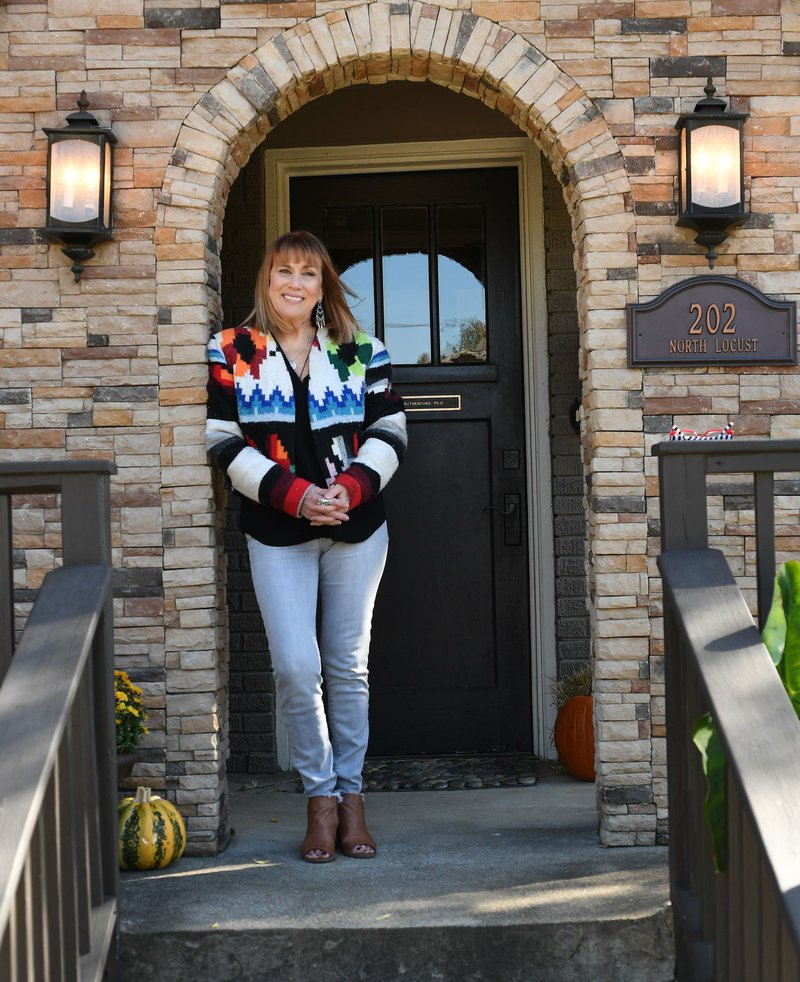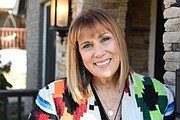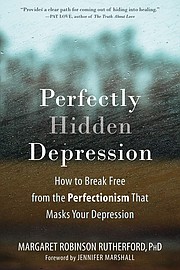The concept behind Fayetteville psychologist Margaret Rutherford's first book -- Perfectly Hidden Depression, released at the beginning of this month -- came from a particularly fraught incident with a client. The client's husband called Rutherford, telling her that he was worried about his wife, whose mood seemed particularly down that morning and who was not answering her phone. In what Rutherford acknowledges was a rather unconventional request, he asked Rutherford to go and check on her.
"Now this was a woman who I had not diagnosed with depression at all," recalls Rutherford. "She looked pretty anxious, overworked, fatigued by a lot of things in her life. Not particularly happy in her profession. Had some abuse in her childhood, emotional criticism, that kind of thing. So in her treatment, I thought, 'We've got to get her anxiety under control.' But [her husband] convinced me -- his gut, and then my gut, starting firing off signals, but I didn't really know why at the time."
Dive Deeper
Margaret Rutherford will be reading from and signing her new book, Perfectly Hidden Depression, at TheatreSquared next week.
When: 5:30 p.m. Nov. 16
Where: TheatreSquared, 477 W. Spring St., Fayetteville
FYI: Hors d’oeuvres catered by Knife and Fork, wine and beer and music by Ashtyn Barbaree.
Information: (479) 445-6333
Next Week
Anne Kamps
Little Rock
Thank goodness she followed her instincts. When Rutherford went to check on her client at her home, she was shocked and dismayed to discover that the woman was attempting to die by suicide.
"She was really the first person that I began to recognize, 'Wait a minute -- this particular presentation of depression just doesn't show itself in the same way,'" says Rutherford. "And I began trying to look for it more [so that I could] help the people who came to me with that."
Thus Rutherford's exploration of "perfectly hidden depression" began.
"Many of us were raised to believe that mental illness of any kind is a weakness, or worse -- a sign of failure," says the blurb on the back of the book. "And if you're a perfectionist, admitting that you have a real problem with depression can be extremely difficult. But the truth is that your perfectionism ends up fueling your depression further -- and so the cycle continues."
In to the light
When Rutherford began mulling over the concept of this hidden depression, she had already become a noted blogger of mental health issues at drmargaretrutherford.com and a columnist for media sites like the Huffington Post. When she published a blog post about how depression manifests in perfectionists, the post went viral. When the Huffington Post re-published the article with her email address attached, she woke up the next morning with somewhere around 200 emails in her inbox.
"Now remember, these are people who are hiding, right?" marvels Rutherford, who was gratified -- if a bit overwhelmed -- at the response. "They were saying, 'How did you figure this out? I've never heard about this.' One Fayetteville woman -- who I immediately emailed back -- said, 'I was going to hurt myself soon, but now I'm going to go home instead and talk to my family. I didn't know there was a name for this.'
"It's not a diagnosis. No one is calling me to ask me to give input to the [Diagnostic and Statistical Manual of Mental Disorders]. It's what I call a 'syndrome,' which is a group of behaviors that are often found together, kind of like codependency."
That Rutherford found herself authoring a book at all came as a complete surprise to her, she says, but it started with baby steps that slowly accelerated over the years.
"I never thought about writing a book -- literally, if you'd told me 10 years ago that I would be writing a book, I would have said you were crazy," she says. The blogging started with encouragement from her friend, Jeannette Balleza Collins, an entrepreneurial coach. Though it started out as a way for Rutherford to share her experiences as an "empty nester" -- her son, Rob, had just left for college -- it quickly morphed into something else as Rutherford's private practice continued to elicit topics Rutherford thought merited further discussion. When podcasts started gaining popularity, Rutherford realized it was yet another way to extend the conversations about mental health, and the SelfWork podcast was born.
"On the podcast, I say that I've done this to extend the walls of my practice," she says. "I'm now in the top 10% of Apple podcasts in mental health and health and fitness. I talk about perfectly hidden depression, but I also talk about a lot of other things -- relationship issues and how you address where you want to go in your life, what kind of changes you might need to make."
In the beginning
Speaking of changes: Rutherford has been through a few over the course of her life. She started her professional life as a musician. She counts jingle singer, session musician and nightclub chanteuse among her past positions, but what she really wanted to do as she headed off to college was become a church choir director. Majoring in music, however, was not quite what her traditionalist parents had in mind.
"I'd always been in music and loved theater, and I did a lot of musicals, things like that," she says. "I really wanted to be a music major, but Mom and Dad were kind of stuck in the 1950s. In their minds, I was probably there to find a husband. I never did. Well, I picked up a couple of them later. I did do a lot of performing [in college], but I got a French degree, actually, which has done me no good."
Rutherford was born and raised in Pine Bluff, the daughter of a funeral director -- Ralph Robinson and Son Funeral Directors is now in its fifth generation of Robinsons -- and the family was well-known and well-respected in the community.
"It was a typical sort of Southern childhood," she says. "The racial divide was very, very difficult. [As a child,] I could see that African-Americans were so much more poor than white Americans. It was a nice place to grow up, but not so nice if you weren't Caucasian."
College in Memphis and a year of study in Europe opened the eyes of the small-town girl from Arkansas. She returned to the states cognizant that her goal to become an opera singer was out of her grasp but not ready to give up on music as a career. She pursued a graduate degree in vocal performance in Texas.
"It was at that point that I began to recognize that maybe I ought to look in to other genres of music if I really wanted to make my living doing this," she says. "My first husband was the director of the jazz group [in graduate school], and he really encouraged me to become a jingle singer. So I did. I studied pop singers and jingle singers and tried to emulate their sound, and, about a year-and-a-half later, I started auditioning for studios and became a jingle singer."
She had married young, and her first marriage failed, kicking off a period that she characterizes as "chaotic."
"I started singing in nightclubs," she says. "I loved singing for a living, and that's quite a badge of honor in the music business, if you're not waiting tables, and you're actually making a living as a musician. But I had grown up with a dad making a steady income, my mom being a stay-at-home mom, and, literally, if you got a gig for three months, that was a gig for only three months. You were constantly selling yourself. Then I got into a marriage that was really an abusive relationship, and there were seven years in there that I got really, really lost."
Her second marriage was emotionally and, sometimes, physically abusive.
"It was very hard to get a second divorce -- very, very hard," she says quietly. "But I knew I had to do it. I was acting in ways that I wasn't proud of -- it wasn't just him. It brought out the worst in me."
In practice
Rutherford had started working the overnight shift at a hotline for women experiencing abuse during this time -- she would go straight from a nightclub appearance to report for duty at 2 a.m. -- and found the experience so fulfilling she ended up as a volunteer coordinator. Soon, she was exploring the possibility of becoming a music therapist, but when one of her internships placed her in a hospital psychiatric ward, she felt an immediate sense of duty.
"That's when I walked around and said, 'Oh, these are the folks that are struggling, that are lost,'" she recalls. "If I can, I want to be involved in trying to help them -- because therapy has helped me a lot." When she earned her Ph.D. and began working as a therapist, she had no doubt she had made the right decision. "I loved it, I knew I was doing the right thing, and I knew it was for me."
By this time, Rutherford had married her husband, Dick, to whom she's been married for 29 years now. They moved to Fayetteville, which, Rutherford laughingly says, checked all of her boxes: The bars served wine out of bottles, not boxes; you could find fresh basil in the grocery store; and the ratio of therapists to population seemed reasonable. It was there that the couple had a son, Rob. Soon after moving here, Rutherford's private practice was flourishing.
"She was anxious about going into private practice, but I could tell that in no time she would be as busy as she wanted to be and told her so," says Robert James, who has been friends with Rutherford since soon after she moved to Fayetteville. "Compassion, focus, caring are words to describe Margaret, at the same time straight forward and willing to call a person out (in a kind way) to get the best results for their therapy."
"She has a special gift -- the art of listening, finding the root cause of issues and moving people toward a catalyst for change," notes friend Kindra Williamson. "Margaret is as straightforward as they come, not pretentious and always focused on helping others."
Though Rutherford's "period of chaos" was behind her, she vowed to be brutally honest with her clients -- and on her blog, in her podcast and her articles -- about that period of her life, as well as other periods where she struggled.
"I took that risk, and people have written me and said, 'Thank goodness you tell us who you really are. We don't need you to be perfect, we need you to just be open.' And the more I've done that, the more I've realized, 'How are you supposed to sit over there on that sofa and reveal to me stuff you're embarrassed about, stuff you don't want anyone to know, if I don't do it myself?'
"I remember when I moved here, I told my therapist, 'I'm moving back to a small town in Arkansas. There's no way in hell I'm telling anybody I've been divorced twice. No way.' Well, someone was sitting right where you are one day, and she said, 'I've just filed for my second divorce.' And she looked up at me, and she said, 'But I'm sure you would know nothing about that.' And I looked at her and said, 'You are about to join a club I've been a member of for a long time.' She said, 'Really?' I said, 'I'm not proud of that fact. It's not a plaque I have on my wall. But it's part of what made me me.'"
"So that's what I decided to do back then and still do."
On stage
Being transparent about her life meant Rutherford continued to perform once she opened her private practice. It was too difficult to leave the music behind. The first show in which she was cast was a production of the musical review Tintypes -- Rutherford was tapped to play the 1920s radical political activist Emma Goldman.
"I remember having lunch with a friend and saying, 'They've offered me the part, but I don't know -- I'm trying to establish a practice here, and do people want their psychologists coming out on roller skates and giving socialist speeches?' And she looked at me and very wisely said, 'No. Some people will see that and say, "Oh, she's one of those theater people." And other people will say, "Well, thank goodness she gets out of that office and has a little fun."'"
Rutherford met Amy Herzberg and Robert Ford when she performed the lead in Herzberg's production of A Little Night Music at the University of Arkansas; Ford starred opposite her. When the couple started talking about opening up the theater company that would eventually become TheatreSquared, says Ford, Rutherford was one of the early, and most enthusiastic, supporters.
"The very moment that we started to get serious, I think she came to us and said, 'Boy, I would like to be a part of helping start this theater,'" remembers Ford, who is the artistic director at T2. Rutherford would serve as the first board president at the theater. "Her heart is in the foundation of this theater as is her incredible energy and enthusiasm and intelligence. She's got this lovely generous spirit, which is at the heart of what we want TheatreSquared to be, so she kind of brought that and informed the early days of TheatreSquared."
"In so many ways, Margaret is fixed in the DNA of TheatreSquared," says T2 executive director Martin Miller. "She was our first board president, putting in scores of hours of volunteer and advocacy work for the very young company. Just one example -- she sponsored the keyboard that we've used in every musical since 2005. And so it felt particularly perfect to have Margaret and Dick as leaders, and among our most generous donors, for our recent campaign to build a permanent home. It's hard to imagine that we'd be where we are today without Margaret's support.
It seems fitting, then, that Rutherford's first book signing is being held at T2.
"To have her be the first book signing in the theater makes a lot of sense -- this is just the kind of event we want happening in our Commons," says Ford. "That it happens to align with this really cool moment for Margaret is kind of perfect."
Rutherford's contributions to nonprofits in Northwest Arkansas go beyond just TheatreSquared -- for one example, she works with Welcome Health, a free health clinic in Northwest Arkansas.
"Seeing a need and [being] willing to step up and do something" is one of her best qualities, says James, as well as "volunteering countless hours of her time to several organizations [and] giving not only her time, but financially supporting many organizations in the area."
"On many occasions, Margaret has called me to ask for advice not for herself, but for another organization that she's signed on to help support -- always a wonderful community cause," says Miller. "She has a clear 'rising tide' philosophy -- that good done for one community organization benefits all of us in the community. It's an inspiring model."
For Rutherford, the fact that she's a published author seems to still be a bit of a wonder and surprise. She attributes a lot of credit to others who encouraged her along the way: friend Jeannette Balleza Collins, colleagues Christine Matthias and Melissa Schultz and, most of all, her husband Dick, without whom, says Rutherford, the book would not exist. But when she talks about the trajectory of her life and the lessons and experiences that have brought her to where she is today, the book seems inevitable. Whether in her lovely, comfortable office just off the Fayetteville square, on her blog or podcast or on stage in a theater, it seems she has always been someone is compelled to share what she's learned in the hopes that it could help others.
"I learn so much from people," she says. "I was talking yesterday with a woman about the perfectly hidden depression thing, and she said, 'Do you think perfectionism starts getting better as you get older? Or is it harder because of some inherent losses?' And so we had this fascinating discussion about aging and perfectionism and self-discipline and self-acceptance.
"I had to keep [my career] a growing experience for me. There are lots of ways of doing therapy, but a niche for me seemed to be what I heard another therapist called 'executive style' -- asking questions, suggesting action. I think you can gain a lot from insight. Insight gives you context. It gives you connection. But where you really get hope from is when you change your behavior."
"Margaret is an amazing human being -- her artistry as a singer and as an actor is really consummate," says Ford. "The fact that she bridges that artistry as a performer and practitioner and is also profoundly sensitive to the human struggle that she encounters every day in her practice just makes her a really unique individual and somebody that we're really lucky to have in our community."
NAN Profiles on 11/10/2019



